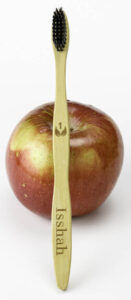It is thought that the first toothbrush was a simple bristle-lined stick developed by the Chinese during the Tang Dynasty, while the enlightened Babylonians worked to keep their pearly whites gleaming with chew sticks as far back as 3500 BCE. These twigs were often gathered from aromatic trees that not only helped the user clean his teeth but also sweetened their breath.
 While our familiar toothbrushes came into the marketplace at the end of the 19th century, it was not until the 1930s when DuPont Chemical Company developed nylon and the tooth scrubber went from being made of natural materials to mass-produced plastic.
While our familiar toothbrushes came into the marketplace at the end of the 19th century, it was not until the 1930s when DuPont Chemical Company developed nylon and the tooth scrubber went from being made of natural materials to mass-produced plastic.
It is safe to say that in the distant future, archeologists will probably uncover the earliest versions of our 20th century plastic toothbrush in nearly original condition. Worse, over recent decades, a majority of our hygienic tools are not being properly disposed of, but are finding their way into the natural environment. And as the American Dental Association suggests that we replace our toothbrushes every three months, this equates to nearly one billion toothbrushes are being discarded per year in the United States alone.
To stop this conveyor belt of waste, both traditional and new manufacturers are returning to the toothbrush’s humble origins – natural materials.
Several manufactures have turned to bamboo for the toothbrush handle and, in some cases, the bristles. Bamboo is one of the fastest growing land-based plants allowing for frequent harvest and sustainability. Unfortunately, nylon bristles are still considered best. The material is gentler against the soft tissue of the gum. It also works best at sweeping away narwal bacteria found in the gaps between the teeth. Charcoal-infused bamboo bristles that are found with some natural toothbrushes are stiffer but have been found to absorb oral bacteria on a microscopic level.
Our coffee-drinking, candy-bar-eating staff took it upon themselves to shelve their traditional plastic toothbrushes and give an assortment of sustainable toothbrushes a whirl.
Toothbrushes from Isshah and Nuduko both offer biodegradable bamboo brushes with eco-friendly, BPA-free bristles. After several weeks of use, no one had a negative report about the stiffness in the bristles of either product.
SimpliGOOD offers toothbrushes made from BPA-free, plant-based plastic. Their bristles are nylon, so they conduct their hygienic services more traditionally. Still, most waste with conventional toothbrushes is from the handle.
Lingito offers another charcoal/bamboo toothbrush. With BPA-free soft bristles, the company offers eco-friendly and natural toothbrushes that come numbered and individually packaged. Lingito also provides a 30-day money-back guarantee to ensure your satisfaction.